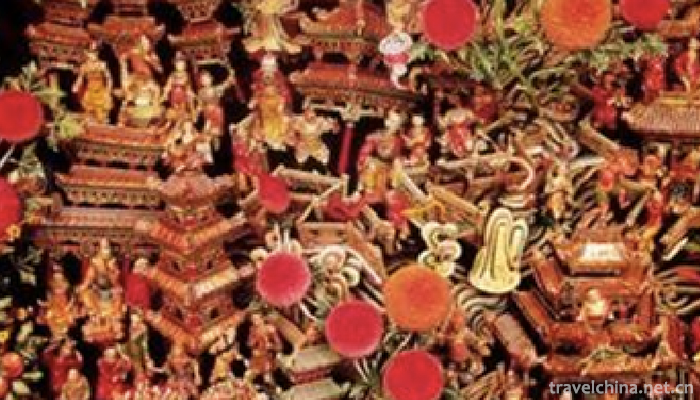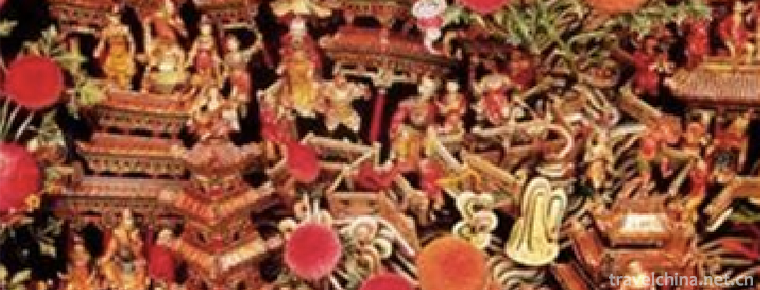Sweat green
Sweat green
"Khan Qing Gele" is a heroic epic of the Mongolian people in Haixi. In the form of rap and speech, it tells the story of the Mongolian heroes destroying demons and saving the people, flashing the wisdom of the Mongolian people in pursuit of a better life.
In June 2008, the "Khan Qing Gele" declared by Haixi Mongolian and Tibetan Autonomous Prefecture of Qinghai Province was listed in the second batch of national intangible cultural heritage list with the approval of the State Council.
Heritage serial number: 557 I-70.
historical origin
The Hercynian heroic epic Khan Qing Gele in Haixi, Qinghai Province, has the special local characteristics of Haixi. It is a folk artist of the Hercynian Mongolian nationality who, in the form of rap or speech, vividly reflects the history and social life and production of the Mongolian nationality in plain language. In the heroic epic, the intense war between heroes is mainly aimed at expanding the grazing land with abundant water and grass, plundering population, beauty, horses, livestock and property, or revenging blood and kin. It shows people's desire to conquer nature, pursue happiness, and abhor the dark forces of the old times. It flourished at the end of primitive society and at the beginning of slavery.
primary coverage
Qinghai Mongolian heroic song and dance epic "Khan Qing Gele" governs the Northwest Plateau of Bayin Hudel Alaten Khan's Prince Khan Qing Gele to marry far away. On the way, they met the hunter Made Wulan, and they went together. The two passed through three difficulties and went to the girl's home. But at the same time, the God Kuleghu and Battle came to marry. The two sides could not argue. The girl's father (Bali Magzhil Khan) proposed to use wrestling, archery and horse racing to decide who would marry the girl who took him. After a fierce competition, Khan Qing-gler defeated God's Kuleghu and Bartel and married Naren Zandan as his wife. When he returned to his Khanate, Pythagus robbed Khanqingler's father and his family's property, leaving his home in ruins. Khan Qinggler went to Pythagus for revenge. Khan Qinggler overcomes many hardships on his way to find Pythagus. Eventually, he kills the vicious Pythagus, defends his hometown, rescues his relatives, returns to the capital of the Khanate Kingdom to hold a grand wedding and live a happy life. The epic embodies the noble moral character of Khan Qing-gler, who loves his hometown, motherland and people, advocates the spirit of heroism and advocates people's pursuit of a peaceful, free and equal life.
A variant of Khan Qing Ge Le, which is popular among the Mongolian people in Qinghai and Subei counties, also describes that with the help of the Jieyi brothers, the hero Khan Qing Ge Le, through his father-in-law's three competitions of horse racing, archery and wrestling with heroes, has countless Mongolian epic poems that test the marriage type of the wife and hero by marrying the Zandan girl.
The epic "Khan Qing Gele" recorded by Schinbachtu in 2006 is transcribed as it is, without modification. In addition, the epic "Hudel Altaihan" sung by Robson in Slavic by Tubai and Cao Lumeng of the Language Investigation Group in 1957 in Subei County, Gansu Province, was also published here according to the records.
Inheritance significance
This heroic epic is rare in Mongolian folk literature and has important historical research value. The Hercynian heroic epic Khan Qing Gele is a wonderful flower in the Mongolian cultural treasure house, which contains the wisdom and wisdom of the Mongolian people, and is praised by scholars both inside and outside the province as one of the three peaks of Mongolian folk literature in Qinghai.
Inheritance and protection
Among the second batch of national intangible cultural heritage lists and the first batch of expanded intangible cultural heritage lists published by the State Council, Haixi Mongolian Tibetan Autonomous Prefecture of Qinghai Province has two intangible cultural heritage lists. Among them, the Hercynian heroic epic "Khan Qing Gele" was listed in the second batch of national intangible cultural heritage list.
Influenced by Qinghai's natural environment, in the process of inheritance, there are variations, with strong regional characteristics of the West. Hercynian Mongolians call "heroic epic" as "Tuji", and their rappers as "Tujiqi". The number of Tujiqi in the world is very small, and they are old enough to face the crisis of inheritance and need to be rescued and protected urgently.


-
1.Daocheng County
Daocheng county is located in the southwestern edge of Sichuan Province, south of Ganzi. Located in the southeast of the Qinghai Tibet Plateau, the eastern side of Hengduan Mountains.
Time 2018-10-12 -
2.Dang Kou ancient town
Dangkou Ancient Town is located in the southeast of Xishan District, Wuxi City, Jiangsu Province. It is adjacent to the Yue noble tombs and Taibo Tombs in the west, and to Suzhou and Changshu in the e
Time 2019-01-08 -
3.Rong Guo Fu
Rongguofu, located in Zhengding County, Shijiazhuang City, Hebei Province, is a group of archaized buildings with the culture of the late Ming and early Qing Dynasties as the background. In 1986
Time 2019-02-07 -
4.The Twin Colossals
Shuangta Mountain is located ten kilometers southwest of Chengde Summer Resort in Hebei Province, with a total area of 3000 hectares and beautiful scenery. It is the largest natural scenic resort in C
Time 2019-02-08 -
5.Tianlong Tunpu
Tianlong Tunpu Town is located in Pingba District, Anshun City, western Guizhou Province. Deep in the mountains of karst landform, Tiantai Mountain and Longan Mountain are two mountains
Time 2019-02-21 -
6.Traditional Cotton Textile Techniques
Chinese traditional textile technology has a long history. Since cotton was introduced from India in the 7th century, Chinese textile industry has changed from linen to cotton.
Time 2019-04-19 -
7.play and sing at the same time
To play and sing is to accompany with instruments and sing by oneself. Generally, guitar, piano and so on. In China, there are also folk instruments such as three strings and pipa.
Time 2019-04-25 -
8.Kirgiz costumes
"Kirgiz" means the people who live on the cliffs. Another saying is that "Kirgiz" are forty girls. This statement is wrong. Most of the Kirgiz people live in Xinjiang's Kizilesu Au
Time 2019-05-09 -
9.Wheat straw cut and paste
Straw clipping is a traditional folk handicraft. Also known as "wheat straw clipping", "wheat straw clipping". Using the natural luster of wheat straw and the characteristics of ru
Time 2019-05-16 -
10.Clay sculpture
Clay sculpture, commonly known as "color sculpture" clay sculpture art, is an ancient and common folk art in Chinese folk tradition. That is to say, a kind of folk handicraft made of clay mo
Time 2019-06-07 -
11.Sichuan Book Review
Sichuan commentary, also known as vernacular speech and commentary, is one of the traditional operas in Sichuan Province. It is popular in all parts of Sichuan and Yunnan and Guizhou. The performers t
Time 2019-06-16 -
12.Beijing Institute Of Graphic Communication
Beijing Printing College is a full-time general higher education institution established by the Beijing Municipal People's Government and the former General Administration of Press and Publication. Th
Time 2019-09-22